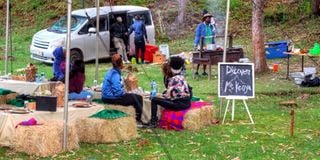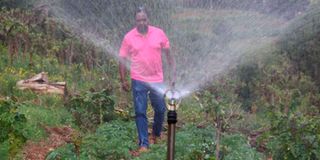Premium
Farm tourism brings in the cash for me

Visitors at Kwa Gakii agro-tourism Farm in Meru County.
What you need to know:
- Seth Muriithi’s 14-acre farm, which is located on the slopes of Mt Kenya, hosts a waterfall, several magnificent sites, sheep and various crops, all which combine to give unforgettable experiences to holiday makers who flock there.
A cool breeze blows from Mt Kenya as the Seeds of Gold team drives from Nanyuki town towards Timau in Meru County.
After about 30 minutes, we end up on a lush green 14-acre farm, hosting a variety of crops and over 20 Dorper sheep as well as cottages that overlook the mountain, giving visitors who stay there a scenic view.
“Welcome to Kwa Gakii Farm,” says Seth Muriithi, the owner, as we sit down for an interview after exchanging pleasantries. “I started the farm three years ago but accelerated activities in the last two years to honour my mother, Gakii, who passed on,” he adds. Through the farm, Muriithi is promoting agro-tourism, as people tour for hiking experience, eat nyama choma by a waterfall, go for nature walk and engage in interactive cooking of food he produces.
“The visitors come to the farm, havest the food they want and give it to the in-house chef for cooking or they can cook themselves,” he says.
Muriithi relocated to the farm at the onset of the Covid-19 pandemic in March 2020 from Nairobi where he worked as a web developer.
“Initially, I farmed sugar snaps, snow peas and French beans mainly as a telephone farmer but abandoned them after realising that the markets were highly controlled by brokers making it hard to break even,” says Muriithi, who has now shifted to Hass avocado, tree tomatoes, macadamia and passion fruits alongside various food crops like vegetables, potatoes and tomatoes.
He sourced the fruit seedlings from Nyeri at Sh150 each. “Everything on this farm is organic, I don’t use any inorganic fertilisers or chemicals to fight pests.” When planting, he advises farmers to maintain two metres between each fruit tree that should be planted in a two-feet hole, filled with half-a-bucket of well-dried goat manure – in particular.

Seth Muriithi at his Kwa Gakii farm at Timau in Meru county on May 25, 2022. Photo/ JOSEPH KANYI
“With good management that include top dressing with fertiliser every three months and pruning, I should be getting my first harvest from tree tomatoes in nine months,” says the farmer, adding his visitors will enjoy them.
On another side of the farm, Muriithi, who employers three workers, farms Shangi potatoes and maize in an open field under sprinkler irrigation, drawing water from a river.
Besides allowing visitors to cook the potatoes on the farm, he sells them at Sh4, 000 a bag. Away from the maize and potato sections, there is a 50 by 100ft greenhouse where he grows capsicum, herbs, sukuma wiki, spinach, cabbage, beans, spring onions, beetroots and a host of other crops in small portions.
What is grown in the greenhouse, according to Muriithi, is informed by his clientele.
“What I practice here is companion farming where I mix a little bit of everything. The herbs and mint help in keeping insects at bay as the crops benefit from each other,” he explains.
The farm takes bookings for team building, luncheons, solo trips and couples.
The Kwa Gakii Farm experience entails guests participating in fruit picking, sheep herding and picnicking besides enjoying the waterfall experience. They are also invited to slaughter a sheep, prepare it and barbeque at the four-metre fall as icy water from the Mt Kenya glacier cools their drinks.
“We offer an authentic, cultural experience as we also teach our visitors about the formation and integration of our community as well as how to pronounce some key Meru words,” says Muriithi.
For the farm visits, he charges Sh1,500 per person, for a group of 10 people and above Sh1,000 each. Besides that, a night at the cottage costs Sh2,000 per person.
“Around 30 people visit the farm every month. However, visitations depend on the season. More people visit on weekends, public holidays, school holidays and during the festive period,” says Muriithi, who says he has so far invested over Sh5 million in the business.
More money comes from orders he gets from hoteliers and ranch owners in Nanyuki, who buy his organic food.
One of the lessons he has learnt in the period he has been in agro-tourism g is that one should be willing to take losses and perseverance pays.
“Initially, I was relying on telephone farming but it did not work. Right now things are working because I am here fulltime, but well, sometimes things will always go wrong.”
According to Zachary Gichane, who owns Aberdare Green Cottages, agro-tourism is picking up in Central Kenya as they leverage on tea, coffee and dairy farming, which are the economic mainstays of the region.
He says for sustainability, one must involve the local community and indulge in activities that benefit the farmer.





